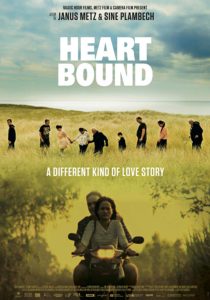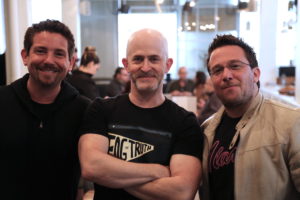Chris Reed’s Top Five Documentaries from TIFF 2018
Written by: Christopher Llewellyn Reed | September 16th, 2018

The Toronto International Film Festival (TIFF) was founded in 1976, as the Festival of Festivals, and adopted its current name in 1995. It is held annually in September and is often a venue (along with Telluride) for the films that eventually dominate the Oscars. This year (running September 6-16), the fest offered 255 features and 88 shorts, delivering a compelling slate of diverse movies, merely a fraction of which I was able to see, especially since I could only be there for 3½ days (the opening Friday, Saturday and Sunday, plus the morning of Monday). As a first-time attendee, I was nearly overwhelmed with the plethora of options, but grateful for the experience and pleased with much of the quality of what I watched.
What follows is a list of my five favorite documentary features, in alphabetical order (numerals first), with brief capsule reviews of each (adaptations of longer reviews I wrote for Hammer to Nail). Sadly, none of my choices received any of the jury or audience awards (trust me, though, that these are excellent movies). What about narrative fiction films? Coming soon; stay tuned! Like what you read? Consider listening to my documentary-themed podcast, The Fog of Truth. Our upcoming start to the fourth season (episode 401) features an interview with TIFF’s head of documentary programming, Thom Powers.
Christopher Llewellyn Reed’s Top 5 Documentary Features:

American Dharma (Errol Morris, 2018) [the paragraph, below, is an adaptation of a longer review I wrote for Hammer to Nail, which has yet to post, as of this writing]
In spite of many problems of conception and execution, Errol Morris’ new documentary, American Dharma, has one major thing going for it, which is how it examines and illustrates the profound effect that Hollywood has had on our collective ideas of identity (be it of race, gender and/or nationality), behavior and ethos. Or maybe the point it makes, instead, is that the great studio dream factories, mid-20thcentury, were mere vessels of aspiration for the masses, who yearned to express themselves through a grand vision of purpose. The truth is more a symbiotic push-and-pull reciprocity between movies and mythmaking, but there is no question that moving-image stories, as heretofore produced, have had a lasting influence on viewers’ sense of self, whether in concert or in opposition to what they watch. Morris does a terrific job deconstructing how the past determines our present and future. Unfortunately, his thesis is also wrapped up in a profile of Steve Bannon, white-supremacist polemicist, political strategist and architect of Donald Trump’s electoral-college victory in the 2016 presidential election. I couldn’t look away, however. As a film historian and teacher of the subject, I had to admire the meta-narrative of how much damage the cinema has done to our world, especially since I love many of the same movies Bannon does. I take heart in the fact that each person’s “dharma” (as Bannon describes it, “some combination of duty, fate and destiny”) is ours to determine, since I and others have taken different lessons from our beloved film idols. The future is ours to make, movies be damned.

Heartbound: A Different Kind of Love Story (Janus Metz/Sine Plambech, 2018) [the paragraph, below, is an adaptation of a longer review I wrote for Hammer to Nail]
Filmed over 10 years, Heartbound – from Danish filmmakers Janus Metz (Borg vs McEnroe) and Sine Plambech (Trafficking) – is a remarkable chronicle of a kind of migration not usually given a positive spin, much less a cinematic spotlight: that of mail-order marriage. As we learn through the opening title cards, there were no Thai women in Denmark’s northern Thy district 25 years ago, yet now there are over 900. How this came about is from the efforts of the exceptionally motivated Sommai, who met her Danish husband-to-be, Niels, when he was on a single-man’s tour of Pattaya, Thailand’s “sex capital.” Despite the transactional nature of their initial introduction, they fell in love, married, and have been together ever since. All the while, Sommai has worked hard to rescue other impoverished Thai women from a life of desperation and prostitution by finding them Danish husbands of their own. And so, Thy became home to many Thai. Despite the potential sordidness (to some) and matter-of-fact discussion of prostitution, this is an ardently humanist film, devoid of false morality, and gloriously open-hearted, as its title suggests, allowing room for a multiplicity of complex reactions to the situation at hand. And yet the truth is simple: where there’s a will, there’s a way, however unconventional. Profound in its documentation of these humble, indomitable survivors, Heartbound is a work of great insight, and a very engaging movie.


Maiden (Alex Holmes, 2018) [the paragraph, below, is an adaptation of a longer review I wrote for Hammer to Nail, which has yet to post, as of this writing]
A documentary that inspires even as it entertains, Maiden – from director Alex Holmes (Stop at Nothing: The Lance Armstrong Story) – takes us on a journey both geographic and historic, following the first all-female crew on a round-the-world sailing odyssey that changes ocean racing forever. The time is the late 1980s, and Tracy Edwards is one of a handful of women sailors with the resolve to take on the male-dominated sport. Against financial and misogynistic odds, they succeed in not only proving that gender bias has no place on the high seas, but that they have more than enough mettle to handle anything men can do, and sometimes do it better. One gets the vicarious thrill of danger and fear, failure and success, all without incurring any risk of one’s own. I found Edwards’ personal trajectory especially satisfying. As she grows from angry young woman to accomplished captain, she gains confidence and accepts the mantle of women’s liberation that she earlier rejects. I think my favorite line of hers, late in the movie, is “now I’m a feminist, perhaps” (talk about understatement). Whatever she is, Edwards is a titan of courage and resolve, as are the other women on her ship. Vive l’égalité!

Screwball (Billy Corben, 2018) [the paragraph, below, is an adaptation of a longer review I wrote for Hammer to Nail, which has yet to post, as of this writing]
Joyfully snappy and wild – though not nearly as crazy as the story it portrays – Billy Corben’s new documentary, Screwball, throws us into the middle of yet another Major League Baseball (MLB) doping scandal, this one not even a decade old. Forget the “steroids era” of the late 1990s and early 2000s, featuring the likes of Mark McGwire, Sammy Sosa and Barry Bonds, this tale is even more nuts. Or at least it feels that way, set to jaunty music and featuring inventive reenactments thanks to a mise-en-scène that keeps us laughing through the horror. Thanks to Corben’s delightful gimmick of using children – dressed as adults (including glued-on facial hair) and lip-syncing to audio from talking-head interviews – in the many recreations of actual events, the unlikely insanity of what transpired is given a surreal flair that only adds to the looney tunes atmosphere. Beyond the facts of the case, the film is a serious indictment of the MLB, as well, showing its complicity in not only past drug crimes, but these later ones, as well. Or, at least, the organization is complicit in the cover-up (and isn’t the cover-up almost always worse than the initial crime?). Corben (Cocaine Cowboys) is no stranger to exposing institutional misdeeds, but what truly disturbs is how widespread the official efforts to minimize the scandal go. At least we get this truly entertaining film, however. It’s a cinematic home run.


The Truth About Killer Robots (Maxim Pozdorovkin, 2018) [the paragraph, below, is an adaptation of a longer review I wrote for Hammer to Nail, which has yet to post, as of this writing]
Before you get either too scared or overly excited, know this: there’s really only one case of a robot directly killing a person in The Truth About Killer Robots, the new film from documentarian Maxim Pozdorovkin (The Notorious Mr. Bout), and we learn about it right at the start. For the rest of the movie, what Pozdorovkin does, instead, is explore the many ways in which Artificial Intelligence (AI) is taking over our lives, making us increasingly obsolete. It’s hardly a new argument, but Pozdorovkin assembles a variety of interesting research in his particular assessment of the future. Perhaps the most captivating of the metaphysical ruminations is the one centered on the question of robot guilt and the famous laws of roboticsput forward by science-fiction author Isaac Asimov, especially the ones that state that “a robot may not injure a human being” (First Law) and “must obey orders given it by human beings except where such orders would conflict with the First Law.” Are these enough to govern our latest and emerging inventions? Are they out of date? What will happen when, say, an AI-controlled weapons system is ordered to kill humans? We may find out sooner than we think. For now, we have Pozdorovkin to thank for raising the issue in this cogent, comprehensive way.
That concludes my list of five favorite documentaries. Keep an eye out for my upcoming list of favorite fiction features.


